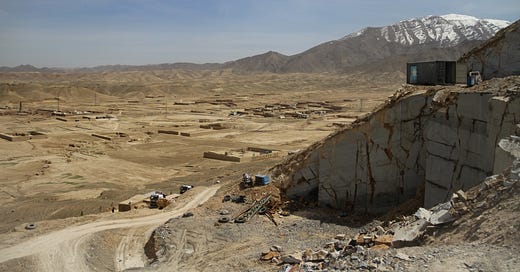By: Salman Rafi Sheikh
Earlier this month, China became the first country to appoint a formal ambassador to Afghanistan since the Taliban’s violent takeover of the country in August 2021, an appointment that took place even though China has come under attack by jihadists, when the IS-K attacked a hotel in Kabul frequented by Chinese nationals.
No further attacks have taken place even though the anti-China East Turkestan Independence Movement (ETIM) is present in Afghanistan. China’s decision to send its ambassador is thus an indication of Beijing’s growing confidence in the Taliban government’s ability to ensure security and protect Chinese interests.
It is also an indication of China’s eagerness to open up Afghanistan’s considerable mineral resources, which have long been shelved by decades of war. Afghanistan’s reserves are an array of riches coveted by the world’s industrialized countries, from rare earths to precious stones to oil and gas in 1,400 mineral fields, according to surveys. According to a joint study by The Pentagon and the United States Geological Survey, Afghanistan has an estimated US$1 trillion of untapped minerals, a bonanza for one of the world’s poorest and undeveloped countries.
Accordingly, Chinese companies are rushing to do business. In August, the Taliban regime signed multibillion dollar agreements with multiple local and foreign companies, including from China, for mineral extraction. In January 2023, the Chinese company Xinjiang Central Asia Petroleum and Gas Co signed an oil extraction agreement as well. China itself has repeatedly shown interest in Afghanistan’s considerable lithium reserves. The appointment of an ambassador is a gateway to actualizing these interests.
The previous Afghan government signed a spate of contracts in 2019 for exploration of copper and gold deposits in the north with western companies in Washington between the Afghan ministers of finance and mining, and executives from Centar Ltd., an investment company founded by a former J.P. Morgan banker who partnered with local Afghan firms to bid for the mines. But watchdog groups said at the time that aspects of the contracts aggravated questionable practices that marred the mining sector, with strongmen and political elites profiteering from the country’s riches. The contracts never went anywhere and the country shortly after that fell to the Taliban, which have been looking for partners for development since they took over the country.
China has become the first country to woo the Taliban because of Beijing’s overall approach to Central Asia, where it has recently become active in a more political sense. China sees Afghanistan as a country more related to Central Asia than South Asia. By normalizing ties, Beijing is unifying its Central Asian policy. Central Asia has been an important trade partner with bilateral trade in the first half of 2023 standing at almost US$40 billion. Recognizing the potential, China held, for the very first time, a China-Central Asia summit in May 2023.
A recent UN report said that at least 20 terror groups are active in Afghanistan. For Beijing, not only is the sheer scale of terror groups alarming, but the fact these groups, in a context of heightened geopolitical tensions and competition, could also become proxies for China’s rivals and could be used against China in the wider Central Asia region and beyond demands a direct engagement with the Taliban. China, in short, is engaging with the Taliban to buttress the regime’s capacity against these groups i.e., doing a politics of co-opting one militant group against other militant groups.
But China’s outreach has its limits as well. Most importantly, Beijing is still unsure if the Taliban regime can really – and is willing to – eliminate terrorism. This is most clear from the fact that the Chinese companies making agreements with the Taliban do not include major state-controlled companies, such as the China Metallurgical Group Cooperation. Taking a cue from Pakistan, Beijing seems to have learned that flawed security situations can derail otherwise promising projects. Certainly, Beijing does not want to repeat the same in Afghanistan. Therefore, it is, for now, content with testing the waters via small, unknown companies.
But Beijing cannot continue to do this beyond a reasonable time. It needs Afghanistan to comprehensively, if not absolutely, eliminate terrorism. For this, Beijing needs to bring a regionally accepted anti-terror framework that the Taliban regime must embrace and implement. Beijing, in simple words, needs to utilize and reorient the Shanghai Co-operation Organization (SCO) towards this objective.
Thankfully, the Afghan Taliban has repeatedly expressed its interest in the SCO i.e., to attend its summit. This is out of the group’s ongoing quest to win international recognition. What China needs to do is to link any possibility of recognition with the Taliban’s visible action against the Afghanistan-based terror groups.
This is crucial because, according to the 17th report of the Secretary-General on the threat posed by ISIL, the anti-China ETIM is allied with the IS-K and acquiring heavy weapons. It means that, even though there has been no attack on China in Afghanistan in recent months, there is always the possibility.
While Beijing is trying to tackle the situation by gaining leverage on the regime, this may not prove sufficient. What could be considered sufficient is if China can use this leverage over the Taliban to stitch the latter with a region-wide anti-terror framework reinforced by the SCO. After all, Beijing is interested in not only eliminating terrorism but also in not leaving any space for its rival states to capture either in Central Asia or via using the Afghanistan-based terror groups as potential proxies.




🙏🏾🙏🏾🙏🏾